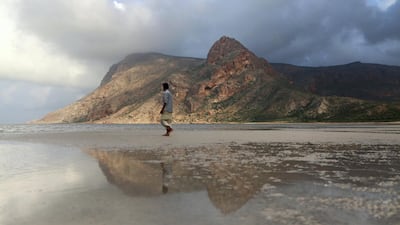The Khalifa bin Zayed Al Nahyan Foundation is supplying residents of Socotra with cooking gas, in a bid to reduce the cutting-down of trees and preserve the Yemeni island's natural habitat.
"Khalifa bin Zayed foundation started this big vital project ten days ago, the residents of the island who were provided with the cooking gas celebrated the event with joy because such basic stuff came back to the island after five years of suspension," Saeed Moeidhed, a recipient, told The National.
The civil war on mainland Yemen isolated the island and gas supply became expensive, causing residents to turn to wood for heat.
Over 5,000 families are expected to benefit from the initiative. Households with old gas cylinders will have free refills while those without cylinders will be given new ones. Last week 458 new cylinders were distributed, Mr Moeidhed said.
_______________
Read more:
Special report: paradise regained in Socotra
UAE sends aid to help Socotra recover from Cyclone Mekunu
Comment: I saw first-hand the UAE’s efforts to rebuild Socotra
Comment: Nurturing a love of nature can have untold health benefits
_______________
Ahmed Saeed, an official for the environment department of Socotra said the project aims to stop the deforestation of the island, a widespread problem that has seen the loss of several types of trees on the UNESCO world heritage site.
According to UNESCO, Socotra's biodiversity is made up of a rich and unique flora and fauna. Thirty seven per cent of the 825 plant species, 90 per cent of its reptile species and 95 per cent of its land snail species do not occur anywhere else in the world. The site also supports globally significant populations of land and sea birds (192 bird species, 44 of which breed on the islands while 85 are regular migrants), including a number of threatened species.
"UNESCO called on the government to take tougher measures to ban cutting the trees through providing the residents with cooking gas," Mr Saeed said. "Khalifa bin Zayed responded to the UNESCO call and launched the project to save the environment."
"The vegetation in Socotra was severely affected in the last five years," explained Mr Saeed. "Rare trees were endangered because of the over use of wood for cooking and for heating homes as well as due to the many cyclones that hit the island lately."
According to the Environmental Justice Atlas UAE commercial fishing boats have added to the depletion of natural resources and fish stocks. The visible impact of the island's degradation can be seen in the loss of biodiversity and landscape, while potential outcomes include food insecurity and waste overflow.
Resident Maher Koushri said he was happy the project was helping to preserve the biodiversity of his island.
"Women were so delighted, celebrating the return of cooking gas to their kitchens after five years of suspension," he said. "All the people pledged to stop cutting the trees all over the island."

